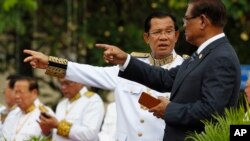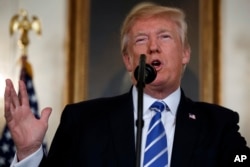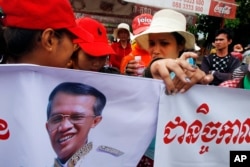Preferential access to Cambodia’s biggest export market could be removed and senior government officials banned from doing business with U.S. companies in response to a court ordered dissolution of the country’s opposition, statements released Friday suggest.
Cambodia’s Supreme Court ruled Thursday to dissolve the opposition Cambodian National Rescue Party (CNRP) and ban 118 of its members from politics for five years for what it determined was a treasonous plot they hatched with U.S. officials to overthrow the government.
The ruling came ahead of a national ballot next year and followed large electoral gains at both the previous parliamentary and local elections for the CNRP — in both cases winning more than 40 percent of the vote.
The European Union, White House and U.S. Senate have all issued strong statements threatening concrete actions in response to the decision — which effectively dismantles any semblance of democracy in the country.
U.S. reaction
In Washington, the State Department said it is “greatly concerned” over Cambodia’s decision to silence the opposition party and said such a move will isolate the country even further.
“Not only does that [ to dissolve the opposition] set back Cambodia's democratic development, it unnecessarily damages Cambodia's relationship with the United States and others in the international community; it weakens Cambodia's economic growth and prosperity; and isolates the country further from democracy to the region,” State Department spokesperson Heather Nauert said during Friday's press briefing.
"The government of Cambodia should undo its dissolution of the Cambodian National Rescue Party, release the imprisoned leader, Kem Sokha, and allow opposition parties, civil society and media to maintain their legitimate activities," Nauert added.
A motion unanimously passed by the Senate on Thursday urged the State Department and relevant bodies “to consider placing all senior Cambodian government officials implicated in the abuses noted above on the Specially Designated Nationals [SDN] list.”
SDN sanctions freeze the assets of targeted individuals, regimes, corporations or countries and generally prohibit U.S. entities from doing business with them, including financing.
The sanctions, which also freeze property interests, are implemented by the Office of Foreign Assets Control and have been applied in nations such as Zimbabwe, Syria, North Korea and Iran.
Will Trump intervene?
The Senate also called on President Donald Trump to intervene directly and make it clear the result of Cambodia’s national election next July will not be recognized under the current conditions.
The White House said in its own statement — the second it has issued rebuking Cambodia this week — that it was terminating support to Cambodia’s National Election Committee (NEC) and its administration of the election “as a first step.”
“It is becoming increasingly evident to the world that the Cambodian government’s restrictions on civil society, suppression of the press, and banning of more than 100 opposition leaders from political activities have significantly set back Cambodia’s democratic development and placed its economic growth and international standing at risk,” it said.
“The United States will take concrete steps to respond to the Cambodian government’s deeply regrettable actions.”
Opposition leader speaks
Sam Rainsy, the opposition leader who resigned in February after Hun Sen, the prime minister, announced plans for a law that could lead to the party's dissolution, told VOA Khmer that Cambodians should demand Hun Sun's resignation, saying if the prime minister remains in power "there will be economic sanctions." The law dissolving the opposition party passed, but it was never applied because Sam Rainsy resigned.
According to Sam Rainsy, Hun Sen must "change his politics to end suppression of the CNRP, to return basic rights and freedom to the Cambodian people, and free all political prisoners, including Kem Sokha, who is president of the CNRP."
Sam Rainsy, speaking in Washington to a Khmer audience on a radio call-in show, said sanctions could be avoided. If "the decision to dissolve the CNRP is canceled, the CNRP will operate again immediately. Our structure remains intact. There were few, almost no defections to the CPP, as Hun Sen called for."
NEC spokesman Hang Puthea said the lack of U.S. support would not affect the country’s election process because the government had already stacked the budget with enough funds to cover the lost funds.
“The budget is already planned and it is the Royal Government of Cambodia which will provide for the election,” he said.
Financial support
Ruling Cambodian Peoples Party spokesman Sok Eysan said Cambodia now enjoyed plenty of financial support from China, Russia and Japan.
“When the U.S. and EU community do not help, I think others big countries in the world who see it is justice, they will help Cambodia for the election process," he said.
The European Union has the greatest potential leverage of all — absorbing about half of Cambodia's total exports — some $5 billion worth.
In a statement on Thursday, the EU suggested preferential access to its markets which Cambodia access on a preferential basis through the Everything But Arms scheme could now be removed.
“Respect of fundamental human rights is a prerequisite for Cambodia to continue to benefit from the EU's preferential Everything But Arms scheme,” it said.
EU spokespeople have not yet responded to a request for clarification over what steps it would now take in reaction to the Cambodian Supreme Court ruling and the local embassy spokesperson could not be reached.
Ken Loo, Secretary-General of the Garment Manufacturers Association in Cambodia, said he could not predict if factories would still be able to export to the EU without the EBA preference, but stressed it was up to politicians, not traders, to sort out disputes like this.
“If the EU did withdraw the preferential access or suspend the preferential access then of course it will have a severe impact on our industry given that about 43, 44 percent of our exports are going out to the EU,” he said.
Labor Ministry spokesman Heng Sour said the European Union and the United States should stop worrying about the political situation and focus on trade
“Cambodia doesn’t rely only on the European community but Cambodia has other country's markets and Cambodia strongly believes that the EU community and U.S. will not kill the encouragement to respect working conditions with trade," he said.
Some 600,000 Cambodians are formally employed in the garment sector with many more believed to be working informally in the same industry - making it the biggest source of regular income in the country.
Unemployment
Employment opportunities are so scarce in Cambodia that an estimated one million people currently work abroad in Thailand despite the country’s reputation for severe exploitation of migrant workers.
For this reason suspension of the EBA as a punitive measure is sometimes referred to as the “nuclear option” and is considered by most analysts to be a highly unlikely measure.
Dr. Lee Jones, an Associate Professor in international politics at Queen Mary University of London, said the experience of similar sanctions in Myanmar demonstrated that while crippling for the sector, they had practically no effect on the regime itself.
“Targeting the garment sector could severely harm the interests of that particular part of Cambodian society would not actually assist in putting pressure on the regime, in fact quite the opposite,” he said. “I mean the state would lose export revenues and things like this but the people who would really be harmed would be the workers in those factories and they’re the main ones that have actually been battling the government on the streets after the last election.”
Targeted sanctions were a better idea, he said, but still had a very patchy success rate at changing regime behavior.
Targeted sanctions were a better idea, he said, but still had a very patchy success rate at changing regime behavior.
Kann Vicheika, Men Kimseng and Soeung Sophat of VOA Khmer contributed reporting to this story.









